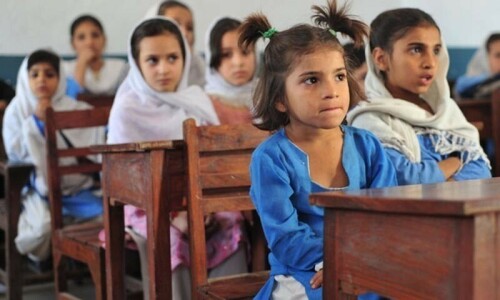ISLAMABAD: World Health Organisation (WHO) representative in Pakistan Dr Dapeng Luo has urged stakeholders and donors to strengthen their support for the government of Pakistan in reinforcing universal health coverage (UHC), particularly for the most vulnerable populations.
This call to action ahead of the International Universal Health Coverage Day was one of the main conclusions of a dialogue hosted by WHO and attended by Coordinator to the Prime Minister on Health Dr Malik Mukhtar Ahmad Bharath, representatives from the Ministry of Planning, Development and Special Initiatives, Benazir Income Support Programme and the Sehat Sahulat Programme as well as national and international partners.
The participants commemorated the Universal Health Coverage Day under the theme “Health: it’s on the government.”
The WHO representative said advancing universal health coverage is crucial to advance the 2030 Agenda because to achieve sustainable development “we need healthy populations, healthy mothers and newborns, healthy workers, healthy families, and healthy communities.”
The WHO representative also said Pakistan had achieved “notable milestones” such as improving its UHC index from 40 in 2015 to 52.7 in 2022, according to the country UHC Monitoring Report 2023. “However, half of the population still lacks access to basic health services. Achieving the target index of 65pc by 2030, while still short of the global benchmark of 80, will require sustained efforts and innovative strategies,” said Dr Luo.
During the event, particular attention was paid to other significant milestones achieved by Pakistan such as the Sehat Sahulat Programme (SSP), which now provides coverage to over 190 million Pakistanis who did not have such protection before 2016 in Azad Jammu and Kashmir, Gilgit-Baltistan, Islamabad, Punjab, Balochistan, Khyber Pakhtunkhwa, and the Tharparkar district of Sindh.
The programme was initially launched for the below-poverty population in 2016 and gradually expanded to universal health coverage in 2020-2021 although the service provided still has its limitations, particularly for out-patient care. Currently, according to the last available data, at least 47pc of Pakistan’s population faces out-of-pocket healthcare expenditures, leading to widespread financial hardship.
The Universal Health Coverage Day celebrated on December 12 as proclaimed by the United Nations General Assembly in 2017 aims to raise awareness of the need for strong and resilient health systems and universal health coverage with multi-stakeholder partners, underlining that for health systems to work they must work for everyone – no matter who they are, where they live, or how much money they have.
Published in Dawn, December 10th, 2024














































Dear visitor, the comments section is undergoing an overhaul and will return soon.